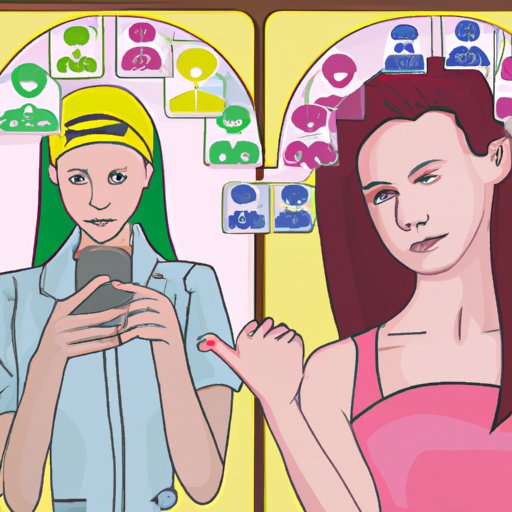Introduction
Technology has become an essential part of modern life and is used in almost every aspect of our daily lives. From communication to entertainment, it has revolutionized the way we interact with the world. However, there are some drawbacks to its widespread use, including potential harm to our mental health, education and security.
Definition of Technology
The term “technology” refers to the application of scientific knowledge to solve practical problems. It encompasses a wide range of fields, from computer science to engineering and biotechnology. In recent years, advances in technology have drastically changed the way we live, work and communicate.

Overview of the Negative Effects of Technology
While technology has made many aspects of life more convenient, it also has certain drawbacks. Its use can lead to mental health problems, affect young people’s development and increase the risk of data breaches and hacking. In this article, we will explore the various ways technology can be harmful.
How Technology Can Lead to Mental Health Problems
The use of technology can have a negative impact on mental health, leading to increased stress and anxiety, isolation and loneliness, and depression. According to a study published in the Journal of Medical Internet Research, “the use of digital technology is associated with increased psychological distress, including stress, depression, and anxiety.”
Increase in Stress and Anxiety
The use of technology can lead to higher levels of stress and anxiety, especially when it comes to managing large amounts of information or completing tasks within tight deadlines. For example, a study published in the Journal of Occupational Health Psychology found that “exposure to technology-related stressors was associated with greater levels of job strain, burnout and work-family conflict.”
Isolation and Loneliness
Technology can also lead to feelings of isolation and loneliness. The constant use of devices such as smartphones and tablets can make it difficult to engage in meaningful conversations and activities with others, leading to a feeling of disconnection and alienation. A study conducted by the University of Pittsburgh found that “increased use of multiple types of social media was associated with feelings of social isolation.”
Depression
Excessive use of technology can also contribute to depression, particularly among young people. According to a study published in the Journal of Affective Disorders, “higher levels of technology use were associated with greater levels of depressive symptoms.” The study found that “social media use, in particular, was associated with greater levels of depressive symptoms.”

The Negative Effects of Social Media on Young People
Social media has become an integral part of many young people’s lives, with many spending hours each day on platforms such as Facebook, Instagram and Twitter. While social media can be a great way to stay connected and share experiences, it can also have a negative impact on young people’s mental health.
Cyberbullying
One of the most serious issues associated with social media is cyberbullying. According to a study conducted by the Cyberbullying Research Center, “nearly one in four adolescents report being cyberbullied at least occasionally.” This can lead to a variety of mental health issues, such as depression, anxiety and low self-esteem.
Exposure to Inappropriate Content
Young people may also be exposed to inappropriate content on social media, such as violence, drug use and pornography. This can lead to a variety of behavioral and emotional problems, including aggressive behavior, anxiety and depression.
Lower Self-Esteem
Social media can also have a negative effect on self-esteem. Constant comparisons to others can lead to feelings of inadequacy and insecurity, which can have a detrimental effect on mental health. According to a study published in the Cyberpsychology, Behavior, and Social Networking journal, “there is evidence that excessive use of social media is linked to decreased self-esteem and increased feelings of depression.”
The Impact of Technology on Education
Technology can also have a negative impact on education. While technology can be a useful tool for learning, it can also lead to shorter attention spans, reduced creativity and plagiarism.
Short Attention Spans
The use of technology in the classroom can lead to shorter attention spans, as students become accustomed to the fast pace of technology-based activities. According to a study published in the Educational Psychology Review, “students who spend more time using technology may have difficulty sustaining their attention in the classroom.”
Reduced Creativity
The use of technology in the classroom can also lead to a decrease in creativity. With the availability of ready-made resources online, students may be less inclined to think outside the box or come up with creative solutions to problems. A study published in the Creativity Research Journal found that “excessive use of technology can have a negative impact on creativity.”
Plagiarism
The use of technology can also lead to an increase in plagiarism, as students may be tempted to copy and paste information from online sources without properly citing them. According to a survey conducted by the Pew Research Center, “nearly two-thirds of college faculty (64%) say they have encountered plagiarism in student assignments.”

The Dangers of Technology Addiction
The overuse of technology can also lead to addiction, which can have a number of serious consequences. Technology addiction can lead to sleep deprivation, poor physical health and relationship issues.
Sleep Deprivation
The use of technology can disrupt normal sleeping patterns, leading to sleep deprivation. According to a study published in the International Journal of Environmental Research and Public Health, “excessive technology use is associated with sleep disturbances, including difficulty falling asleep, frequent waking during the night and daytime sleepiness.”
Poor Physical Health
Technology addiction can also lead to poor physical health, as individuals may neglect regular exercise and nutrition in favor of spending more time online. A study published in the American Journal of Preventive Medicine found that “excessive technology use is associated with obesity, headaches, backaches and eye strain.”
Relationship Issues
Technology addiction can also lead to relationship issues, as individuals may prioritize their time spent online over time spent with family and friends. A study published in the Computers in Human Behavior journal found that “excessive technology use is associated with greater marital dissatisfaction and poorer family functioning.”
The Consequences of Data Breaches and Hacking
Data breaches and hacking are also a major concern when it comes to technology. These incidents can result in the loss of personal information, identity theft and financial losses.
Loss of Personal Information
Data breaches can result in the loss of personal information, such as credit card numbers and addresses. According to a report by the Identity Theft Resource Center, “more than 164 million records were compromised in 2018 due to data breaches.”
Identity Theft
Hackers may also use stolen information to commit identity theft. According to the Federal Trade Commission, “nearly 17 million people were victims of identity theft in 2017.” This can lead to a variety of issues, such as loss of money, damaged credit scores and legal troubles.
Financial Losses
Data breaches and hacking can also result in financial losses. According to a report by McAfee, “cybercrime cost businesses an estimated $600 billion in 2017.” This can have a significant impact on businesses, leading to lost profits and damaged reputations.
Conclusion
In conclusion, technology can be harmful in a variety of ways, including mental health problems, social media issues, educational impacts and data breaches. To mitigate the negative effects of technology, it is important to practice moderation, set boundaries and be aware of potential risks. By doing so, we can ensure that technology remains a positive force in our lives.
(Note: Is this article not meeting your expectations? Do you have knowledge or insights to share? Unlock new opportunities and expand your reach by joining our authors team. Click Registration to join us and share your expertise with our readers.)
